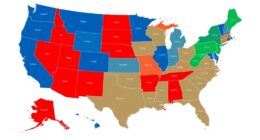Keeping your personal and professional online identities separate helps protect your reputation and privacy. By managing what you share on each, you control how others perceive you and prevent personal details from affecting your career. It also allows you to express yourself freely without risking unprofessional impressions. Setting clear boundaries and customizing privacy settings make this easier. Stay mindful of your online presence; if you want detailed strategies, there’s more to discover.
Key Takeaways
- Maintain separate profiles to control the content shared and prevent personal details from affecting professional reputation.
- Use privacy settings to restrict personal information and sensitive posts from professional audiences.
- Focus on showcasing skills, achievements, and expertise on professional profiles, while sharing personal interests elsewhere.
- Regularly review and update online boundaries to ensure appropriate content separation and protect reputation.
- Strategically manage online presence to create distinct identities that align with personal authenticity and professional branding.

In today’s digital world, your online presence can considerably impact both your personal and professional life. Whether you realize it or not, what you share online influences how others perceive you, which is why keeping your personal and professional identities separate is essential. One of the key steps in managing this balance is establishing clear privacy boundaries. When you understand what content belongs where, you prevent personal details from spilling into your professional sphere and vice versa. For example, sharing casual opinions or personal photos on your work profiles can blur these boundaries, leading colleagues or clients to form unintended impressions. Conversely, posting work achievements or industry insights on your personal accounts might seem harmless but can sometimes come across as unprofessional or reveal sensitive information you’d prefer to keep private.
Maintaining distinct online identities helps safeguard your reputation management efforts. Your reputation is one of your most valuable assets, and once compromised, it can be challenging to repair. By keeping your personal and professional personas separate, you can control what information is accessible to different audiences. For instance, in your professional profiles, focus on showcasing your skills, experience, and achievements, while on personal pages, you can share more relaxed, informal content. This not only helps you project a polished, professional image but also minimizes the risk of personal content being misinterpreted or used against you. It’s wise to regularly review your privacy settings and think critically about what you post, guarantee that your personal life doesn’t unintentionally influence perceptions of your professionalism.
Maintaining separate online identities protects your reputation and ensures personal content doesn’t impact your professionalism.
Furthermore, separating your identities makes it easier to manage your online reputation proactively. When your personal and work lives are intertwined, a single misstep—such as an insensitive comment or a controversial post—can have lasting consequences. By keeping these identities separate, you create a buffer that allows you to express yourself freely in your personal space without risking damage to your professional reputation. This approach also simplifies your online reputation management because you can focus on cultivating a professional image without the clutter of personal content, all while maintaining your authentic self in the appropriate context.
Additionally, understanding privacy policies and cookie categories can help you better control your online data and protect your personal information from unwanted tracking or misuse. Ultimately, being intentional about your online boundaries isn’t just about privacy; it’s about strategic reputation management. You control how others see you, which influences opportunities, relationships, and trust. By consciously separating your personal and professional identities, you protect your reputation, uphold your privacy boundaries, and ascertain that your online presence works in your favor, both personally and professionally.
Frequently Asked Questions
How Can I Merge My Personal and Professional Online Identities Effectively?
You can merge your personal and professional online identities by setting clear privacy boundaries and practicing content segregation. Share appropriate content on your professional profiles, avoiding personal details that could harm your reputation. Use privacy settings to control who sees what, and consider creating a unified brand while maintaining boundaries. Regularly review your online presence to guarantee your content aligns with your professional image, fostering authenticity without compromising privacy.
What Are the Risks of Overlapping Personal and Professional Online Profiles?
When your personal and professional online profiles overlap, you risk privacy concerns and identity theft. Your private information could be exposed to potential malicious actors, putting your security at risk. Employers or clients might see personal posts that damage your reputation or create conflicts. To protect yourself, consider keeping profiles separate or adjusting privacy settings, ensuring your personal life doesn’t unintentionally impact your professional image.
How Do Employers Perceive Personal Social Media Activity?
Back in the day, social media was just a novelty, but now, employers often scrutinize your personal activity. They see your posts as reflections of your professionalism, raising privacy concerns and blurring online boundaries. If your personal profiles show unprofessional content, it could impact their perception of your character. To protect yourself, maintain appropriate posts and consider keeping personal accounts private, so you control what employers see and avoid unwarranted judgments.
Can Personal Online Content Impact My Professional Reputation?
Your personal online content can definitely impact your professional reputation, especially if you blur privacy boundaries or share inappropriate posts. Employers often view your online activity as a reflection of your character, so maintaining clear privacy boundaries helps protect your reputation. By actively managing your online presence and being mindful of what you share, you control how others perceive you professionally and avoid potential negative consequences.
What Tools Are Available to Manage Multiple Online Identities?
Imagine your online presence as a garden with separate beds. To keep your digital landscape tidy, you can use tools like privacy settings and account separation features. Social media platforms often let you customize privacy, while apps like Hootsuite or Buffer help you manage multiple accounts smoothly. These tools act as your digital gardener, ensuring your personal and professional lives grow in harmony without encroaching on each other’s space.
Conclusion
Maintaining separate personal and professional online identities helps safeguard your reputation; in fact, 70% of employers check social media before hiring. By keeping your personal life private and showcasing your professional skills, you control how others perceive you. Remember, what you share online can have lasting effects. Staying mindful about your online presence ensures you present the best version of yourself in both worlds—so take charge and keep those identities distinct.









